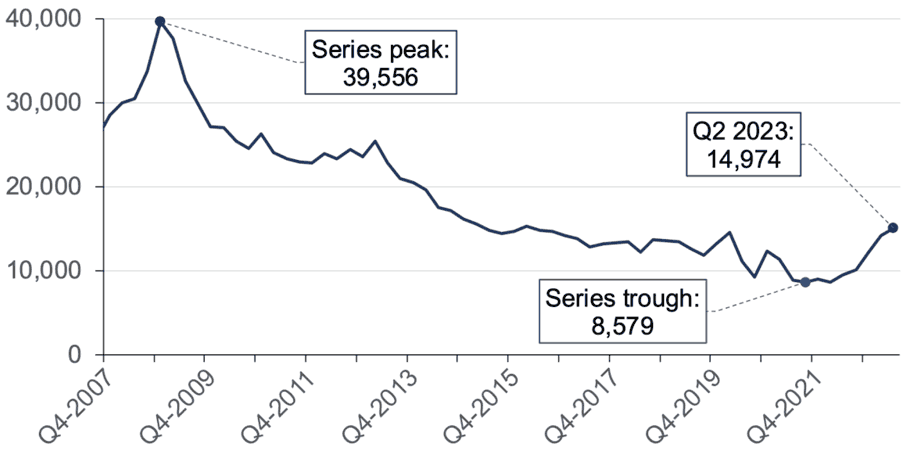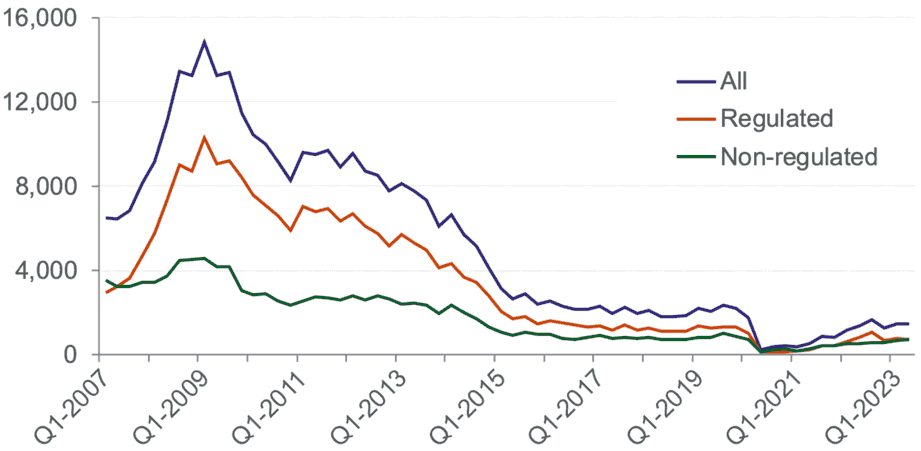Scottish Housing Market Review Q3 2023
Quarterly bulletin collating a range of previously published statistics on the latest trends in the Scottish housing market.
8. Mortgage Arrears & Possessions
8.1. Arrears
As shown in Chart 8.1, following a peak of 39,556 in Q4 2008 during the financial crisis, there was a long-term declining trend in the number of regulated mortgage accounts entering arrears, which continued during the covid period to reach a trough of 8,579 in Q3 2021.[4] (Source: FCA). Since then the level of arrears has begun to increase, and there were 14,974 accounts that went into arrears across the UK in Q2 2023, an annual increase of 58% and an increase of 75% since the trough (although these changes are from a very low base) and the highest since Q1 2016. Compared to the average for 2019-20, immediately prior to the pandemic, the level of arrears in Q2 2023 was 15% higher.

Source: FCA. Includes both securitised and unsecuritised loans
The share of lenders' outstanding regulated mortgage balances that were in arrears of more than 1.5% of the outstanding loan balance stood at 0.94% at the end of Q2 2023. This share had remained broadly stable during the pandemic but then started to increase towards the end of 2022 and into 2023. Chart 8.2 plots the share of lenders' outstanding balances that were in arrears by degree of severity. As would be expected, the categories which have recorded the largest increase in share since the recent trough are the lowest arrears categories (1.5% - 2.5% and 2.5% - 5%) since it will take time for arrears to accumulate. In Q2 2023, the share of the highest category of arrears (10% or more) is, at 0.22% of total loan balances, currently still approximately in line with its average in the post-covid period (0.21% over the period from Q2 2020 to Q2 2023).

Source: FCA. Includes both securitised and unsecuritised loans; share is calculated as balances on cases which are in arrears, expressed as a % of total loan balances
UK Finance data shows that there were 13,760 BTL mortgages in arrears of 1.5% or more of the outstanding balance across the UK at the end of Q2 2023, up by an annual 81%. The number BTL mortgages in arrears of 1.5% or more as a percentage of the total number of BTL mortgages was 0.68%, the highest level since 2013. FCA data for non-regulated lending (which includes BTL lending but also some other types of lending, and is collected on a somewhat different basis to UK Finance data[5]) shows that at the end of Q2 2023 balances in cases where mortgages were 1.5% or more in arrears represented 1.20% of total loan balances, up from 0.84% a year earlier, and the highest figure since Q4 2016, although it remains well below the peak of 3.93% reached in Q1 2009 during the financial crisis.
8.2. Possessions
FCA data (see Chart 8.3) shows that despite restrictions on possessions being lifted since 1 April 2021, there were only 720 new regulated mortgage possessions across the UK in Q2 2023. This was a decrease of 115 (14%) relative to a year before, and also 42% below the average for 2019-20, the fiscal year preceding the pandemic. The 748 non-regulated mortgage possessions (which includes buy-to-let mortgages) in Q2 2023 was similarly 13% below the average for 2019-20. Meanwhile, UK Finance data show that there 440 BTL properties taken into possession across the UK in Q2 2023, a 26% annual increase, but 31% below the level in Q1 2020, immediately prior to the pandemic.

Source: FCA
In June 2023, the Chancellor of the Exchequer met with the UK’s principal mortgage lenders and the FCA, they agreed to a new mortgage charter which provides support to residential mortgage customers. The charter states that anyone can call their lender for information and support without any impact on their credit score. Residential mortgage customers who are up to date with payments can change to interest-only payments or extend the term of their mortgage and return to their original mortgage deal, within six months, with no impact on their credit score. The banks and mortgage lenders have also agreed there will be a minimum 12-month period before there is enforcement of repossession orders without consent.
Contact
Email: Bruce.Teubes@gov.scot
There is a problem
Thanks for your feedback